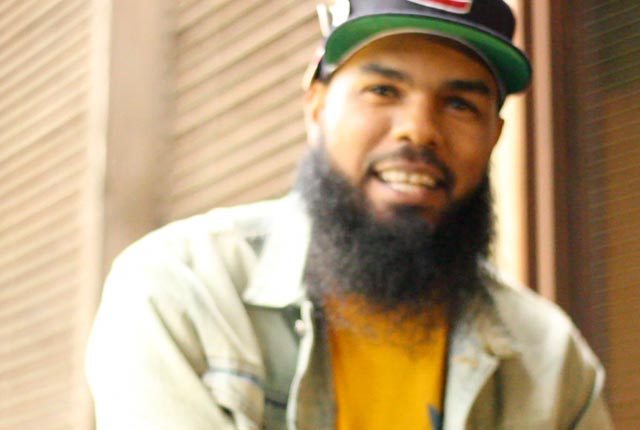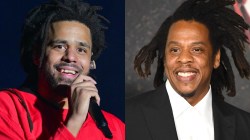Before he had the luxury of a major label deal, Stalley was earning co-signs from the likes of Mos Def, Damon Dash and Nike. Roughly four years after transitioning from an NCAA Division I point guard, to a retail manager to a full-time emcee, the only thing different now is that his beard is longer and Warner Bros. is picking up the tab on his Hip Hop endeavors.
Last year, after joining Rick Ross and Wale under the Maybach Music Group banner, the Massillon, Ohio native flipped his Lincoln Way Nights mixtape into a retail release. This year, roughly a few weeks before the MMG press conference that spawned a few dozen different Twitter hashtags, we caught up with Stalley again. On a rare cloudy day in Southern California, he reflected on the past year, his latest release—Savage Journey To The American Dream—and upcoming projects with Ross whom he regards as a big brother.
HipHopDX: What will your contribution to Self Made Vol. 2 be, and what can fans expect overall on that project?
Stalley: I probably have recorded at least 10 or more records for Self Made—either individually or throwing a verse on something. Ross’s idea is for me to be featured heavily on Self Made since I’m the newest member. He wants the people to know who I am along with my brand, face, music and what I’m about. That helps to keep on carrying on for the future when I start putting out more music.

AD LOADING...
DX: How hands on is Rozay? Do you two keep in contact pretty frequently?
Stalley: We definitely keep in contact. We both hit each other just to check in randomly. This morning I woke up to a text from him saying the picture I posted on Twitter of me and my daughter at Disneyland was beautiful. He was just excited about that. I know Ross is someone who is real big on putting family first and taking care of each other. It’s a beautiful thing to have someone like him, and I look at him as a big brother. He’s the first person to really believe in me also, as far as taking me to the next level and helping me to live out my dreams. He sees a superstar in me like I see. And he wants to do everything to help get me to that level. I just love him for that.
DX: Between Blue Collar Gang, your early work with DD172 and now Maybach Music Group you’ve repped a lot of teams. How do you balance that with maintaining your individuality?
Stalley: I’ve always been one who can bring something to the table as opposed to waiting on someone. I just bring my sound and my style, and fortunately enough it compliments the Maybach Music sound without me losing my personal palette. I think that’s what Ross liked when he first heard me. He felt like I was someone that was an icon and a superstar in my on right, and I was someone that could bring something different to Maybach Music. That’s what I’ve been doing, and it’s been working out perfectly.

AD LOADING...
As far as right now, I’ve been doing a lot of shows and moving around. But when I’m not moving around, I’m always working on new music—writing verses for Self Made Vol. 2 and my own individual songs. Ross hit me up and said they want me to start working on the album. So there’s just a lot of good things coming up, and I balance my time between the stage and the studio. It’s been good, but it’s been a different kind of beast. You have to be a savage. Because, like I said, we ask for these things and when you get them it might be more than some people can handle. But so far, I’ve been able to handle everything I’ve wished for. There’s just so much more that I’ve got to get and that I’m working towards getting.
DX: Historically, the top rappers have always had a flair for style. You worked at Alife, and you’re heavy in the shoe game. How does that style carry over into your rhyming?
Stalley: Well fashion has been a first love from day one. I think basketball, fashion and music have always gone hand in hand for me. It’s always been a toss up about which one I love the most, because I’m so passionate about [them all]. Growing up, I always liked to look nice and my family always liked keeping me looking nice and clean. So it just grew with me. I was managing Alife out in New York, and I met a lot of different people that either worked in or managed streetwear brands. As I started to get into music, it was just natural for them to reach out or even for me to reach out to them. We’d try to collaborate—whether it was shirts or whatever. I’ve done shirts with 10Deep and Mishka, and I’ve also put out a project [Lincoln Way Nights] with Mishka. So fashion is definitely something I like to incorporate into the music.
DX: I want to go a little deeper into your savage journey explanation. Because at one point you had played for two Division I schools and then you ended up working at Alife and rapping on the side…

AD LOADING...
Stalley: As kids we all have dreams. We have these goals that we set for ourselves, and when we do accomplish them we find that we want so much more. There’s always so much more to get. Of course, when we’re in a bad situation, we rationalize it by saying, “Well, if I could just get this one thing, then I’ll be out of this situation.” But when you get that one thing and you’re out of that situation, you’re like, “C’mon man. I gotta get more [laughs].” When you’re a kid you think, “If I can get that car or if I can get a million dollars…” But when you get that car, you want to put rims on it and put a system in it. You’re never satisfied with that one thing, and that’s just us being savages as human beings. We’re always wanting more.

DX: You really kind of touch on that aspect with “Tell Montez I Love Her.”
Stalley: That was one song that I had to kind of force out of myself. I’m used to being someone that’s kind of a hermit. I kind of keep to myself, vibe out and chill as opposed to letting my feelings go. But it was important for me to give that to the listeners. I wanted to let people see that different side of me and what I battle as far as coming up, being a rapper and the things that you deal with. When you’re rapping, you do it for yourself. And you definitely want to help your family and help others around you. But at the same time, there’s that feeling of wanting to accomplish things for yourself. So that was me just giving the people my insights on my different battles. But people love that song…it’s a lot of people’s favorite.

AD LOADING...
DX: Between the cadence and the subject matter, would you say that song is your biggest challenge to date?
Stalley: Nah. Maybe something like “Seen It All” or “Live At Blossom.” Those were both produced by Soundtrakk, and they were both kind of mainstream productions. I’m used to more of that vibing, jamming production—l like my music to jam with those subs and that bass that rides. But [Soundtrakk] took it there. He’s got that Grammy feel. It’s a stadium sound that translates to everybody and all genres of music. You have kids singing the hook to “Live At Blossom.” So it’s something where I had to figure out how to not be so lyrical and still get my point across. Some tracks aren’t meant to be super lyrical.
That’s a thing too, because I love challenges. I love working on new types of sounds…just the aspects of creativity and putting together something different from the last song or project. It was very important to get that across in the music. With the production, it was important to get some stuff that would allow me to stretch my range and bounce around with different flows, rhyme patterns and different schemes.
DX: You worked with a pretty consistent group of producers, but they all have vastly different styles. How do you approach those different styles, and is it difficult to tailor your flows?

AD LOADING...
Stalley: I kind of just go for vibes and whatever fits the music or mood of the tape at the time. With Block Beattaz, I met them before I even started working on Savage Journey To The American Dream. They shot me some beats, and I remember picking like 30 of them. So it took me a couple of weeks to just sit down, vibe out and listen to them. But once I did, everything they had just fit the mode. It was just a blessing that I was able to work with one group of producers through the whole project. That cohesion really came through, and I got to throw in Soundtrakk and Chad Hugo from The Neptunes too. And again, I just let them hear some of the music, and it just naturally worked out.
It’s about finding that thin line between what fits my style and my sound. At the end of the day, you’ve got to work with something that’s going to allow you to get the best possible raps out of it. You still want to get your message across in a powerful way without letting the music drown you out. So I look for production that compliments me. my sound and the space of my flow so I can get a message across. It’s very important for me to be heard, and I want my lyrics to reach the audience.
DX: And yet you also want to make sure you dont get pigeonholed as the “conscious rapper…
Stalley: I don’t want people to be like, “This is a conscious rapper. Oh, he’s trying to preach to us.” It’s not like that. There’s so many sides to me, and I’ve been through so much. So I just share my life through the music, and that’s all I know how to do. I can only be me and give you myself. I can’t make a record that isn’t me, because it’s just impossible. I’m not a fake human being or someone that goes with fads, trends or tries to fit in. I’ve always been someone who’s had a strong personality and been an individual no matter what group I’ve been in. So it’s important for me to do that with the music also.

AD LOADING...
DX: Right. But theres some depth there too. I think some people dont realize the beard isnt totally a style thing—its tied into your faith too.
Stalley: The beard is definitely part of my faith; I’m a Sunni Muslim. I wear it proudly, and I don’t wear it as an image or a costume. Some people might see it as that, or think, “If Stalley cut his beard, he don’t have anything no more.” But my beard means more than something you can translate with me as the rapper with the beard. It’s definitely been here from day one.
I’ve been rapping for four years, and it’s been a part of this whole journey. It’s somethint that I can look at and actually see grow right along with me and my career. When I’m stressed out and going through something, it’ll be scraggly and breaking off. And that makes me think, “Man. I gotta take care of my body better, drink more water and stop stressing out.” The same thing applies when I’m going through good things. It’s shining, it’s full and I’m like, “Yeah…I’m in a good place.” So it’s definitely a reminder, and it’s a kind of strength that I can carry along with me.
I grew up on Nas, Wu-Tang and Ice Cube and Scarface. And they always either kicked gems, had the Five Percent lessons or just spirituality in their music. That’s always held close to me, because I’m a spiritual person as well. I love to be able to kick those little gems here and there and not just have braggadocio raps. I like to give people things they can take on, and apply to their lives. Outside of music, I had a lot of older friends that would school me to the game and tell me things. I like to put those in my raps, because it meant so much to me. If it helped me, it’s only right that I put those in some verses and try to help other people.

AD LOADING...
RELATED:Stalley Reveals Tracklist For “Lincoln Way Nights” Reissue

![Funk Flex Backs Up Drake's Payola Allegations: '[He] Is 100% Right!'](https://app.hiphopdx.com/wp-content/uploads/2024/11/funk-flex-backs-up-drake-payola-allegations.jpg?w=250)

